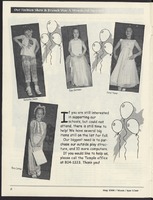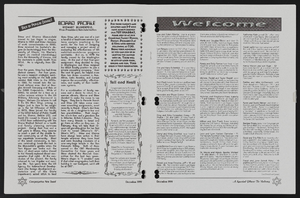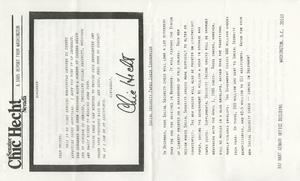Search the Special Collections and Archives Portal
Search Results
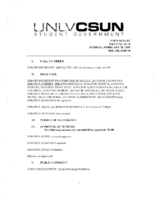
Meeting minutes for Consolidated Student Senate, University of Nevada, Las Vegas, February 28, 2005
Date
Archival Collection
Description
Text
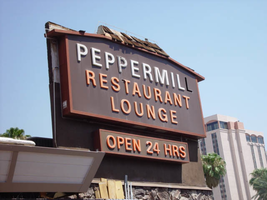
Photographs of Peppermill signs, Las Vegas (Nev.), 2002
Date
Archival Collection
Description
Site address: 2985 S Las Vegas Blvd
Sign details: The Peppermill Inn Restaurant is located on the east side of Las Vegas Blvd, just north of the now defunct Silver City Casino. The actual establishment faces west toward the strip, separated from the traffic by the front parking lot. The lowrise brown clad establishment, boasts three specific pieces of signage on the exterior structure. In the parking lot near Las Vegas Blvd, a small two-sided, ground level cabinet, mirrors the aesthetics of the actual structure. Upon the west side of the building, the shingled roofline boasts channel letters filled with neon, as well as a more secluded sign on the north side of the building, toward the rear.
Sign condition: Structure 3 Surface 3 Lighting 3 The condition of the three different pieces of signage are all in different states of repair.
Sign form: Pylon; Fascia
Sign-specific description: The pylon sign, which sits near the street, is a miniature representation of the facade of the Peppermill establishment. Two square legs, constructed of mortared pieces of stone support the two-sided cabinet. The horizontal, rectangular cabinet sits on the pole, and faces north/south. The top edge of the sign is reminiscent of a roofline, with a low rise a-frame design. The grade is very little but exaggerated by the rectangular element rising off of the top edge covered in brown wooden shingles, which also cover the top edge's surface. The effect of the top's finishing is the resemblance of the roof of the Peppermill restaurant. Just below the peak of the "roof-like" element on the surface of the sign, a rectangular metal plate possesses text. The text is stamped out of the metal to reveal recessed negative spaces of fonts. An orange transparent material resides behind the plate, providing the hue for the internally lit apparatus. The text reads "24 Hours" in all capitals. Below the small rectangle, larger, white text runs the length of the sign. The internally lit, closed face, channel letters are in all capitals. In smaller text, along the bottom portion of the face the phrase "Coffee Shop & Lounge," runs the length of the text. The letters are orange, closed faced, internally lit. The actual structure of the restaurant, further east on the property is the model for the previously mentioned sign. The low-rise pitched roofline of the facility concludes at a lowrise rectangular cap. Along the western edge the roofs overhang, large white channel letters lined on the interior with pink neon spell "Peppermill" in all capital letters. Following the brown shingled roofline around the south side of the building, a third sign, not seen by the general public, faces south. A steel cabinet is the two-dimensional representation of both the outer pylon sign as well as the structure itself. A rust colored brown cabinet houses a dork brown steel face, with plastic letters for the advertising of the establishment. "Peppermill" is spelled in all capital letters. Below the top text a two lined, series of orange all capital text spells "Restaurant Lounge." It is apparent that wooden shingles were evident on the top the top edge of the cabinet which rises in the pitched front geometric shape seen on the pylon in the front and the architectural element in the structures center. Underneath the primary cabinet a smaller, horizontal, rectangular cabinet, sits centered underneath the It too is a rust colored brown cabinet, with a dark brown face. Text, as tall as the cabinet spells, "Open 24HRS" in orange plastic all capital letters.
Sign - type of display: Neon; Incandescent; Backlit
Sign - media: Steel; Plastic; Masonry
Sign - non-neon treatments: Graphics; Paint
Sign animation: Chasing, flashing, oscillating
Notes: The text, which resides on the southern wall and reads "Casino," is filled with incandescent bulbs that all illuminate at the same time, and oscillate. They then shut off at the same time, and then repeat. The raceways of incandescent bulbs chase each other while the neon, which surrounds the back lit, plastic, screens on this wall flash on then off. The bottom two raceways sandwiching the reflective panel chase from left to right, while the remainder of the raceways surrounding the signs, run right to left. The incandescent bulbs on the pylon chase each other gracefully up the length of the pylon. The animation is patterned so as to appear as if a section of several bulbs are pulsing its way up the towers, hugging the edge of the bulbous tops. The raceways continue around the east face of the building. The umbrellas in the plaza behind the pylon, also are animated with incandescent bulbs chasing each other downward along the raceways.
Sign environment: The area surrounding the Peppermill contains several interesting properties making the entire area sort of a cove of history. Just to the north the deteriorating, and closed Silver City stands testament to the wave of constant change present on the strip. It is a reminder of the historical significance of the Peppermill and the fact that someday it might not be present at this location any more.
Sign manufacturer: YESCO
Sign - thematic influences: What is evident of the Peppermill theme works around the exterior appearance, and around the name itself. The brown wooden exterior, use of wooden shingles as adornments, and the major color palette all suggest the rustic, if not old west referenced, aesthetic.
Sign - artistic significance: This has become a statement of the "old Vegas" of the 1970s.
Surveyor: Joshua Cannaday
Survey - date completed: 2002
Sign keywords: Pylon; Fascia; Neon; Incandescent; Backlit; Steel; Plastic; Masonry; Paint; Graphics
Mixed Content

David Ober interview, October 11, 2017: transcript
Date
Archival Collection
Description
Tucson, Arizona, native David Ober moved to Las Vegas twice. He arrived reluctantly the first time in 1978 with his parents as a high-school student, when his father, Hal Ober, came to Las Vegas to begin building and marketing the U.S. Home (now Lennar) brand. While the elder Ober soon left U.S. Home to open his own home-building business, R.A. Homes, his youngest child left Las Vegas shortly after his high school graduation to return to his native Tucson, follow in the footsteps of his siblings, and attend the University of Arizona. After graduating from the University of Arizona David Ober opened his own mortgage company and began building a life in Phoenix. In the late 1980s he agreed to take a large pay cut, return to Las Vegas, and learn his father's business from the ground up. At the time, Hal Ober was developing his award-winning, master-planned community, Desert Shores. David Ober, the youngest of the five children of Hal and D'Vorre (Dee) Ober, agreed to participate in the
Text
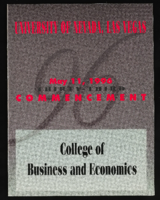
University of Nevada, Las Vegas (UNLV) College of Business and Economics 33rd commencement program
Date
Archival Collection
Description
Commencement program from University of Nevada, Las Vegas Commencement Programs and Graduation Lists (UA-00115).
Text
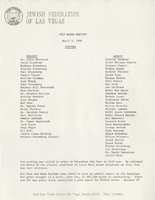
Jewish Federation correspondence, meeting minutes, and other records, item 04
Description
Board Meeting minutes for the Jewish Federation of Las Vegas, Nevada, April 2, 1986.
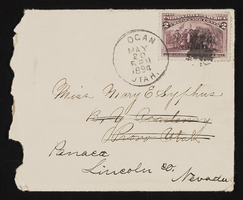
Letter and envelope from John M. Bunker, Logan, Utah to Mary Etta Syphus, Provo, Utah
Date
Archival Collection
Description
From the Syphus-Bunker Papers (MS-00169). The folder contains an original handwritten letter, an envelope, a typed transcription of the same letter, and a copy of original letter attached.
Text

Meeting minutes for Consolidated Student Senate University of Nevada, Las Vegas, May 5, 1988
Date
Archival Collection
Description
Text

